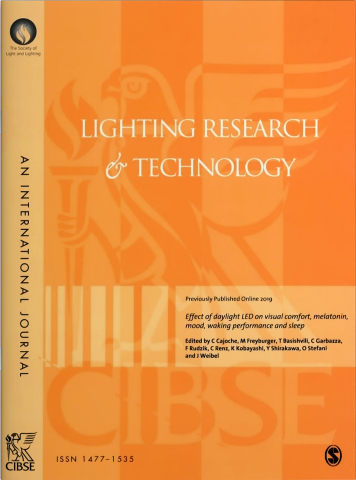Seoul
Semiconductor Co., Ltd. (KOSDAQ:046890), a leading global innovator
of LED products and technology, announced that its SunLike Series
natural spectrum LEDs have been identified as a key light source for
promoting human well-being, based on the results of a recent
comprehensive sleep study conducted by scientists at the University of
Basel.
This press release features multimedia. View the full release here:
https://www.businesswire.com/news/home/20190516005262/en/

Lighting Research & Technology (Photo: Business Wire)
Seoul Semiconductor developed SunLike Series natural spectrum LEDs in
collaboration with Toshiba Materials’ TRI-R spectrum technology in 2017
as the first LED light source to closely match the spectrum of natural
sunlight. The two companies have since promoted this natural sunlight
spectrum technology through its favorable effects on human well-being
and sleep as a key value in the evolution of lighting.
There has been an increase in research activity on the relationship
between light and human bio-function, including a recent scientific
study focusing on the effects of light spectrum on sleep quality, visual
comfort, well-being and daytime alertness conducted by Prof. Christian
Cajochen and his team at the University of Basel in Switzerland,
entitled: “Effect of Daylight LED on Visual Comfort, Melatonin, Mood,
Waking Performance, and Sleep,” published in the
Journal of Lighting and Research Technology published on March 24,
2019.
It is well established that light is one of the strongest control
factors for human circadian rhythms, such as the secretion of the sleep
promoting hormone melatonin. Thus, optimal lighting condition during
daytime are crucial to prevent circadian rhythm disturbances which can
lead to sleep disorders and other life-style related diseases. Over the
past ten years, there have been related scientific studies in the fields
of sleep, chronobiology, physiology, as well as the impact of light
quality in elderly care.
According to Prof. Cajochen’s research, LED light sources with the same
measured correlated color temperature (CCT) and intensity, but different
spectral output, can have different effects on human behavior and
physiology. LED light sources with a spectrum close to natural sunlight
produced better visual comfort, more alertness, and happier moods in the
morning and evening among the test participants, compared to those
exposed to conventional spectrum LEDs. The research tested subjects’
visual comfort, circadian physiology, daytime alertness, mood, cognitive
performance, and sleep after being exposed to both conventional LED
light, and natural spectrum LED light for 49 hours in a laboratory
setting.
Quoting from the paper: “We have evidence that a daylight [natural
spectrum] LED solution has beneficial effects on visual comfort, daytime
alertness, mood, and sleep intensity in healthy volunteers. Delta EEG
activity (0.75–4.5Hz) was significantly higher after daylight-LED than
conventional-LED exposure during the post-light exposure night.” [NOTE:
Delta EEG (electroencephalogram) measurements record delta waves, the
brain waves associated with Stage 3 non-rapid eye movement (NREM) sleep,
or “slow-wave sleep” (SWS), and aid in characterizing the depth of
sleep.]
By providing the same spectrum as sunlight and in the visible light
range, SunLike Series natural spectrum LEDs deliver benefits to human
well-being, consistent with the mechanisms of vision that impact both
image forming and non-image forming aspects of the eye, as well as the
control of circadian rhythms. While the qualities of artificial light
have been described primarily with color and intensity thus far, SunLike
Series natural spectrum LEDs have introduced light spectrum as another
important factor in determining overall light quality.
“This research conducted by the University of Basel suggests another
important aspect to the evolving direction of artificial light over the
past eighty years. In addition to the properties of energy efficiency
and long life, we have added the factor of ‘human well-being’ to modern
LED light sources,” said Nam Ki-bum, sales executive vice-president of
Seoul Semiconductor. “As the world’s first mass-produced LED devices to
achieve natural sunlight quality, SunLike Series LEDs are advancing
lighting technology in this important area as we continue to respond to
market needs from our customers’ lighting applications.”
View source version on businesswire.com: https://www.businesswire.com/news/home/20190516005262/en/